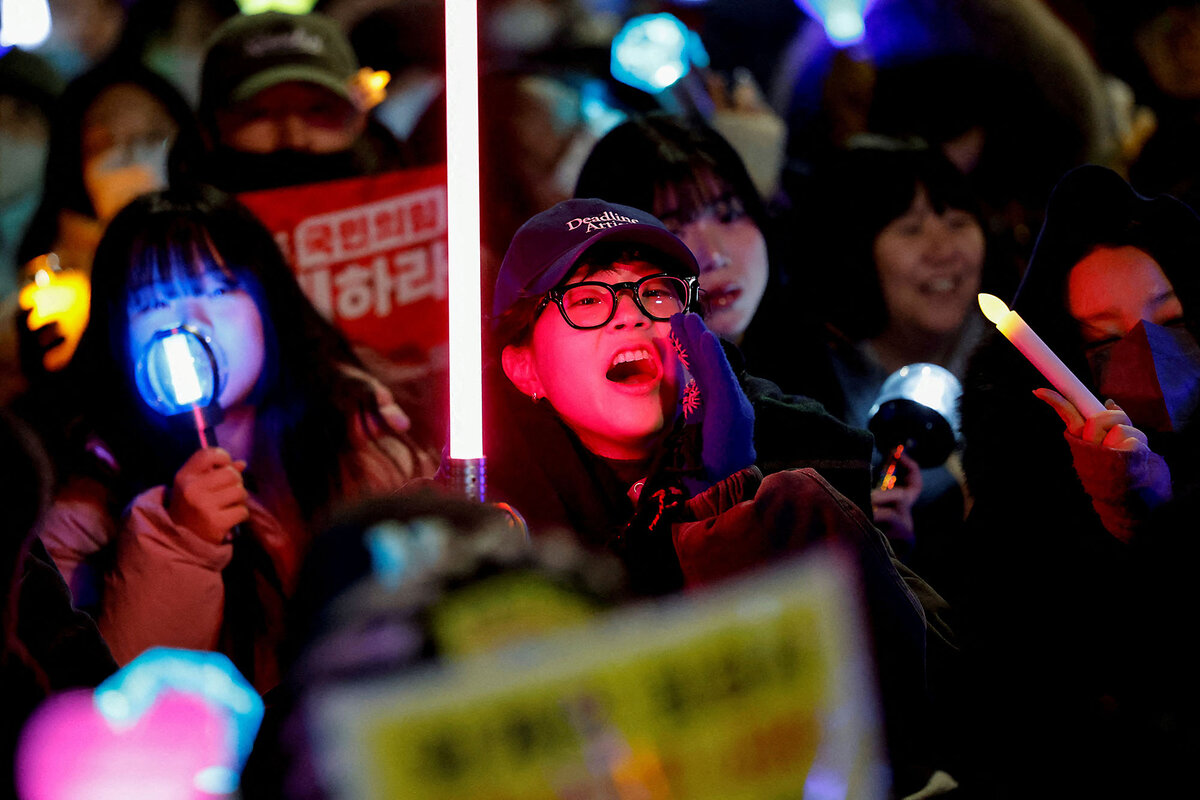What South Korea’s impeachment battle means for US security alliance
Loading...
| Tokyo
The impeachment of South Korean President Yoon Suk Yeol for his aborted martial law decree risks creating a leadership void and deeper political division in a key U.S. treaty partner.
South Korea’s National Assembly voted 204 to 85 on Saturday to pass a motion to impeach Mr. Yoon, who was immediately stripped of his presidential powers. Prime Minister Han Duck-soo has assumed the duties of acting president.
The Constitutional Court now has 180 days to decide whether Mr. Yoon should be removed from office, with its first public hearing set for Dec. 27. An affirmative ruling would trigger an election to choose a new president within two months.
Why We Wrote This
As the Pacific heats up, South Korea is heading into what may be a divisive and drawn-out impeachment battle, casting uncertainty over its relationships with critical security allies.
Meanwhile, China’s increasing military assertiveness in the Indo-Pacific and growing threats from North Korean missiles has made South Korean security cooperation more important than ever. The leadership shakeup in Seoul spells disruption for America’s most consequential security alliance in the region – the tripartite U.S.-Japan-South Korea partnership that gained significant momentum under Mr. Yoon’s tenure – just as the new Trump administration takes office.
“Come January, when Trump takes power, there will be no effective leadership in South Korea,” says Eun A Jo, fellow in International Security at the Dickey Center for International Understanding at Dartmouth College and an expert in East Asian politics. “That’s a big worry.”
A prolonged political battle
Mr. Yoon has defended his Dec. 3 martial law bid as justified to overcome political gridlock created by the opposition Democratic Party, which holds the majority in parliament.
A prosecutor and political newcomer prior to his victory in a photo-finish election in 2022, Mr. Yoon’s popularity has plummeted to about 11% since early December. On Saturday, an estimated 200,000 people showed up at a rally outside the National Assembly to call for his removal, many of them cheering and dancing when the impeachment motion passed.
Nevertheless, Mr. Yoon has vowed to “never give up” his efforts to thwart his ouster. He reportedly did not respond to summons for questioning Sunday regarding a separate, criminal investigation into whether his martial law decree constituted an insurrection. His desire to pursue a vigorous defense threatens to prolong the impeachment proceedings, with the 180-day clock ticking on a ruling.
“The wild card this time is Yoon may put up a really good fight and delay the process,” says Ethan Hee-Seok Shin, a researcher at the Institute for Legal Studies at Yonsei University. He contrasts Mr. Yoon’s defiance with the relative silence of former President Park Geun-hye, who was impeached on less serious charges in 2016 and sentenced to over 20 years in prison for abusing her power. She was pardoned in 2021.
And even if removed from office by the court, Mr. Yoon may continue to try to mobilize his dwindling base of conservative-leaning supporters, who consider the impeachment unfair. This could worsen the polarization in South Korea’s electoral politics, now dominated by Mr. Yoon’s People Power Party, and the main opposition Democratic Party.
“The polarization of South Korean politics has gotten deeper, and that’s made it more difficult to govern,” says Daniel Sneider, an international policy and East Asian studies lecturer at Stanford University and a fellow with the Korea Economic Institute of America. “There has been a drift toward illiberalism and authoritarianism ... not only on the right but on the left.”
“When people come to power there is this purge,” he adds, “and it seems like almost every South Korean president gets either impeached or put in jail.”
Foreign policy shake-up?
Should Mr. Yoon be forced out, Lee Jae-myung, standard-bearer of the center-left Democratic Party, is best positioned to win the ensuing presidential election, experts say. This is true despite Mr. Lee’s multiple charges of corruption. He was convicted last month by a Seoul court for violating election laws, a ruling he says he’ll appeal.
If South Korea’s progressives return to power, it would likely spell a foreign policy shift away from Mr. Yoon’s initiative to improve relations with Japan after years of bitter estrangement rooted in historical disputes. “Japan policy is where we would see the more dramatic shift,” says Dr. Jo.
A win by Mr. Lee or another progressive candidate could also lead to a less pro-American policy than that championed by Mr. Yoon.
On her way to a recent pro-impeachment rally, college sophomore Lee Eum Kyong says she regularly protests against the U.S.-South Korea alliance. “Breaking the alliance is the main goal,” says Ms. Lee, an international politics student at Seoul National University. South Korea is “powerful and independent enough to defend itself,” she says.
Still, experts say Ms. Lee’s views are not widespread in South Korea today.
“Progressives come out of a certain tradition of Korean nationalism that definitely has an anti-American streak to it,” says Mr. Sneider, but this is “always tempered by a certain amount of pragmatism and realism.”
Overall, he says, “Korean public opinion overwhelmingly supports the [U.S.] security alliance because … of the dangers of the world that they live in.”
Indeed, Mr. Sneider believes the larger challenge for the alliance lies not in Seoul, but in Washington.
“The greatest danger is that Donald Trump thinks the United States can do without South Korea,” he says. “It’s American isolationism.”









